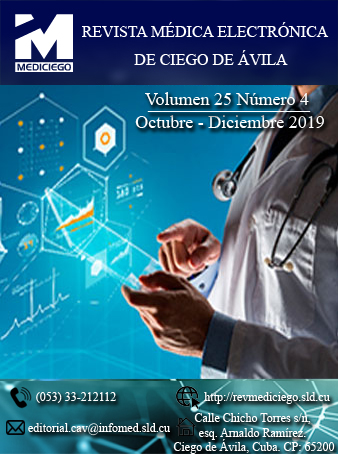Dengue in Cuban collaborators of "La Macandona" Integral Diagnostic Center of Zulia in Venezuela
Keywords:
DeCs, Dengue, Dengue con signos de alarma, Dengue sin signos de alarma.Abstract
Introduction: dengue fever is the most widespread viral disease transmitted by vectors in the world, and constitutes one of the greatest public health challenges in this century.
Objective: characterize dengue as a disease in Cuban collaborators hospitalized at "La Macandona" Integral Diagnosis Center in the 2014-2018 five-year period.
Method: a cross-sectional descriptive observational research was carried out in the “Raúl Leoni” Parish of the Maracaibo municipality, Zulia state, Venezuela. It worked with all dengue patients (294 cases) diagnosed according to their positive immunoglobulin levels on the sixth day. Data were obtained from the income book, the epidemiological survey and individual medical records.
Results: female sex (66,67 %) and the age group of 20 to 29 years (50,35 %) predominated. The presence of the vector was detected in housing and workplaces in 100 % of cases, and no use of mosquito net (100 %). The main symptom found in patients was fever (100 %).
Conclusions: the study identified one of the main causes of admission to employees, risk factors, type and symptoms, so efforts should be directed to the prevention of the disease.Downloads
Published
How to Cite
Issue
Section
License
Copyright (c) 2021 Rafael Miranda Pedroso

This work is licensed under a Creative Commons Attribution-NonCommercial 4.0 International License.
Those authors who have publications with this journal accept the following terms of the License CC Attribution-NonCommercial 4.0 International (CC BY-NC 4.0):
You are free to:
- Share — copy and redistribute the material in any medium or format for any purpose, even commercially.
- Adapt — remix, transform, and build upon the material for any purpose, even commercially.
The licensor cannot revoke these freedoms as long as you follow the license terms.
Under the following terms:
- Attribution — You must give appropriate credit , provide a link to the license, and indicate if changes were made . You may do so in any reasonable manner, but not in any way that suggests the licensor endorses you or your use
- No additional restrictions — You may not apply legal terms or technological measures that legally restrict others from doing anything the license permits.
The journal is not responsible for the opinions and concepts expressed in the works, which are the exclusive responsibility of the authors. The Editor, with the assistance of the Editorial Committee, reserves the right to suggest or request advisable or necessary modifications. Original scientific works are accepted for publication, as are the results of research of interest that have not been published or sent to another journal for the same purpose.
The mention of trademarks of specific equipment, instruments or materials is for identification purposes, and there is no promotional commitment in relation to them, neither by the authors nor by the editor.






















